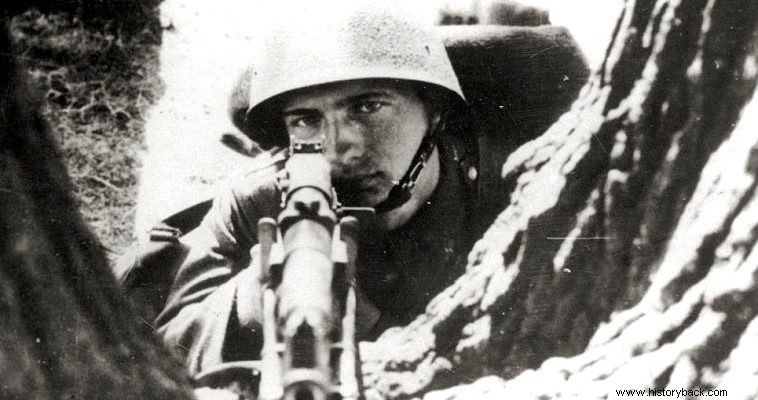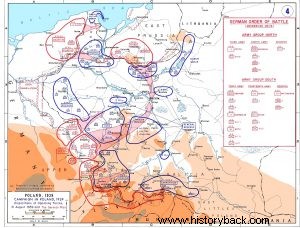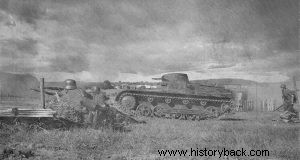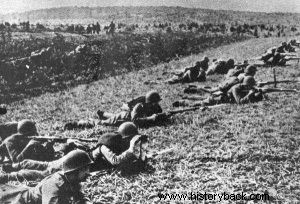
The battle of Miava fought between September 1-3, 1939, could have changed the course of World War II. In this battle, Maudlin's Polish Army clashed with forces of the German 3rd Army.
The term army, however, is rather inadequate to describe the Polish forces that took part as the actual strength was that of an army corps. The Maudlin Army was one of seven that the Polish high command had deployed linearly along almost the entire Polish national territory.
Rearrangement
The Polish administration decided that the Maudlin Army , originally intended to be defended at the Maudlin site, had to be defended now, in more advanced positions at the Miava site, near the German border, maintaining the link with the Naref complex, east.
The Commander of the Polish Army, Brigadier General Emil Krukowicz – Predrmirski , proposed the creation of a rough defensive line north of Mlava by deploying the 20th MP in the new positions. His request was granted but the diary read July 3, 1939.
The line of trenches, concrete works and anti-tank ditches would be constructed along the Miava River north of the city of the same name. In the center of the site the marshes of Niemie did not allow the passage of motorized sections. The marshes divided the site in two. To the west the site would be reinforced with 68 concrete works and to the east with 25.
Construction of the western section of the defensive line began on 14 July and was carried out by men of the 20th MP under the supervision of the divisional Engineer battalion. Construction on the eastern section began on August 12. Volunteers also participated in the project. Nevertheless, when the Germans invaded on September 14, a significant part of it had not been completed.
The Germans invade
At noon on September 1, units of the German I Army Corps (SS), under General Petzel, attacked the Polish 20th MP. The German I SS had the Panzer Division Kempf (7th Panzer Regiment, Motorized Regiment Grossdeutschland) , on the 11th and 61st MP. Despite the German catalytic superiority in numbers, tanks and close air support provided, the Poles fought back brilliantly destroying many German tanks.
The commander of the German 3rd Army, General von Kichler, exasperated, ordered a resumption of the attacks. But each time the result was the same. The Poles fought magnificently, mowing down their opponents.
The Germans retreated in humiliation. The next afternoon, however, they returned, unleashing heavy artillery fire against the Polish right flank. A massive German attack followed. The Polish defense began to falter. The Polish 79th Infantry Regiment (SP) launched an immediate counterattack, but failed to stop the Germans.
So Kruković - Predrmirski called the 8th MP, which he had kept in reserve until then, to support his right flank . Also the Masovian TI moved eastward expanding the Polish flank. The Polish commander ordered his 8th MP to counterattack.
The 8th MP did attack but found itself in front of strong German forces and being pounded at the same time by the German aircraft which were operating undisturbed, it failed. Of her forces her 13th and 32nd SPs suffered heavy attrition. Only the 21st SP retreated in order to Maudlin.
In the sector of the Polish 20th MP, however, the Germans again failed miserably. Only by using Polish civilians as human shields, a despicable tactic, were the Germans able to break through part of the Polish position to the east.
Nevertheless, again the indomitable 20th MP stopped them. Eventually the heroic Polish division was outflanked from the west. Her 79th SS was forced to retreat only after being attacked by the German SS "Vording" (1st, 12th, 217th MP).
After that Kruković-Predrmirski had no choice but to order a retreat. The losses of the Germans in the three-day battle were particularly serious, exceeding 5,800 dead, wounded and missing. They also lost 72 tanks. The Poles had 1,200 dead and 1,500 wounded.
As a result of the heroic resistance of the Poles at the Miawa location, the Germans dramatically delayed their advance on Warsaw from the north. However, the Poles were particularly tested during the retreat from the German air force. It would be really interesting to consider what would have happened if Kruković – Predrmirski had at least two more infantry divisions at his disposal. Most likely, the northern rampage of the Germans had stopped, or at least had been delayed.
In this way the Polish Army of Pomerania could also be saved. This army was hit by the German 4th Army, from the west, and by the German 3rd Army, from the east. However, if Maudlin's Army did not lose the location of Miawa, the German 3rd Army could not, at least so easily, deal with the Polish Army of Pomerania.
It is worth noting that the remnants of the Army of Pomerania, and the almost intact Polish Army of Poznań, fiercely fought the Germans at the Battle of the Bzura River, threatening to upset the German plans.


German infantrymen are supported by a Pz I light tank during the battle at Miava.

